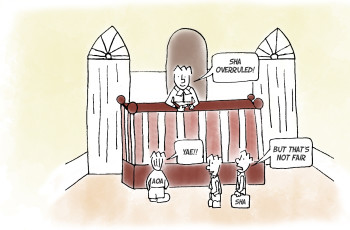Rotation of Auditors
As a measure towards increased independence of auditors the Companies Act,2013 (‘Act’) introduces the requirement of mandatory auditor rotation after the specified period. It also empowers the shareholders to decide rotation of auditing partner and his team or that the audit is conducted by more than one auditor. However, there were no provisions for rotation of audit partners under the Companies Act,1956.
The Naresh Chandra Committee which was set up in the year 2002 laid down stringent guidelines defining the relationship between auditors and their clients. In a move that could impact small audit firms, the committee opined that it would improve the independence of audit firms. However, this committee stressed the need for rotation of auditors in an audit firm.
Ministry of Corporate Affairs notified provisions relating to rotation of Auditors in Companies Act,2013. With effect from 1st April 2014 all specified classes of companies are required to appoint auditors for a limited tenure. This will bring more competence and objectivity in the profession by carrying an attitude of professional skepticism and will decrease the number of scams among companies by increasing accountability of auditors through following code of professional ethics.
Appointment of Auditors includes re-appointment. Section 139 the Act deals with appointment of Auditors. A company shall appoint an individual or a firm as an auditor in its first annual general meeting. However, such an auditor shall hold office from the conclusion of the meeting till the conclusion of its sixth annual general meeting. Which means appointment will be for five years and the next appointment will be after five years. 1 Also Rule 3 of Companies (Audit and Auditors) Rules,2014 specifies the manner and procedure of selection and appointment of Auditors.
However, at every annual general meeting, the company shall place the matter relating to such appointment for ratification by the members. Before such appointment the company should obtain the following from the Auditor/Audit firm:
- Written consent to such appointment and
- Certificate stating that the Auditor/Audit firm will fulfill the criteria to get appointed.
After the Auditor’s appointment, the company shall file a notice of such appointment with the Registrar within 15 days of the annual general meeting. Such notice shall be filed in Form ADT1.
Mandatory rotation of Auditors:
- Sub section 2 of Section 139 acts as a restriction for appointment or re-appointment of auditors. Listed company and or a company belonging to such class or classes of companies 2, those are as follows:
- All unlisted public companies having paid up share capital of Rs. 10 crore or more;
- All private limited companies having paid up share capital of Rs.20 crore or more;
- All companies having paid up share capital of above threshold limit, but having public borrowings from financial institutions, banks or public deposits of Rs.50 crores or more.
However, the concept of rotation of Auditors shall not apply to one person companies and small companies.
The abovementioned companies shall not appoint or re – appoint
- An individual as auditor for more than one term of five consecutive years; and
- An audit firm as auditor for more than two terms of five consecutive years.
- Clause (i) of the first proviso to Section 139(2) provides that an individual auditor who has completed his term under Section 139(2)(a) shall not be eligible to be re-appointed as an auditor of such company for a period of five (5) years from the completion of his term.
- Clause (ii) of the first proviso to Section 139(2) provides that an audit firm which has completed its term under Section 139(2)(b) shall not be eligible to be re-appointed as an auditor of such company for a period of five (5) years from the completion of such term.
Transition Period 3
There is a transition period of three years, from date of enactment of the 2013 Act, to comply with this requirement. All listed companies or specified companies 4 will have to comply with the above provisions relating to rotation of auditors within 3 years from the date of commencement of this Act i.e. within 31st March 2017.
Right of removal or resignation not affected 5
- The right of the company to remove an auditor before expiry of one or two term(s) of 5 consecutive years shall not be affected due to any provision contained in section 139(2).
- The right of auditor to resign from the office of auditor before expiry of one or two term (s) of 5 consecutive years shall not be affected due to any provision contained in section 139(2).
Manner and procedure for rotation of Auditor
Rule 6 of the Companies (Audit and Auditors) Rules, 2014 prescribes the following manner of rotation of auditors by the companies:
In case the company is required to constitute an audit committee, the procedure shall be as follows:
(a) The Audit Committee shall recommend to the Board, the name of an individual auditor or of an audit firm who may replace the incumbent auditor on expiry of the term of such incumbent.
(b) The Board shall consider the recommendation of the audit committee.
(c) The Board shall make its own recommendation for appointment of the next auditor by the members in the AGM.
In case the company is not required to constitute an audit committee, the procedure shall be as follows:
(a) The Board shall itself consider the matter of rotation of auditors.
(b) The Board shall make its own recommendation for appointment of the next auditor by the members in the AGM.
In case of an auditor (whether an individual or audit firm), the period for which the individual or the firm has held office as auditor prior to the commencement of the Act shall be taken into account for calculating the period of five consecutive years or ten consecutive years, as the case may be.
The incoming auditor or audit firm shall not be eligible if such auditor or audit firm is associated with the outgoing auditor or audit firm under the same network of audit firms.
Explanation I – For the purposes of these rules the term “same network” includes the firms operating or functioning, hitherto or in future, under the same brand name, trade name or common control.
Explanation II – For the purpose of rotation of auditors, –
(a) a break in the term for a continuous period of five years shall be considered as fulfilling the requirement of rotation;
(b) if a partner, who is in charge of an audit firm and also certifies the financial statements of the company, retires from the said firm and joins another firm of chartered accountants, such other firm shall also be ineligible to be appointed for a period of five years.
Rotation of Auditors requirements in cases where a company goes through amalgamation/merger/demerger:
For example: XYZ Limited is merging into PQR Limited and PQR is the surviving company. XYZ and PQR have different audit firms and that there was no break in service.
Though no specific guidance is available on this particular matter, it appears that rotation requirements will be decided based on the transferee/surviving company. This is irrespective of the size of the two companies and the name of the surviving company which may or may not have changed. Hence, if PQR is the surviving company and XYZ’s auditors are appointed as auditor of the merged company, they can be appointed for two five year terms. On the other hand, if PQR is the surviving company and its auditors continue to be the auditor of the merged company, the period since their original appointment as auditor of PQR will be included for determining the auditor rotation period.
Related Party Transaction
Cigars & Charity- A CSR Perspective
Leave a comment
You must be logged in to post a comment.









 He holds a Bachelor’s and Master’s Degree in Corporate Secretaryship and a Degree in Law. He is a Fellow member of the Institute of Company Secretaries of India and an Associate Member of the Corporate Governance Institute, UK and Ireland. He has also completed a program from ISB on ‘Value Creation through Mergers and Acquisitions.
He holds a Bachelor’s and Master’s Degree in Corporate Secretaryship and a Degree in Law. He is a Fellow member of the Institute of Company Secretaries of India and an Associate Member of the Corporate Governance Institute, UK and Ireland. He has also completed a program from ISB on ‘Value Creation through Mergers and Acquisitions. Mr P Muthusamy is an Indian Revenue Service (IRS) officer with an outstanding career of 30+ years of experience and expertise in all niche areas of Indirect Taxes covering a wide spectrum including GST, Customs, GATT Valuation, Central Excise and Foreign Trade.
Mr P Muthusamy is an Indian Revenue Service (IRS) officer with an outstanding career of 30+ years of experience and expertise in all niche areas of Indirect Taxes covering a wide spectrum including GST, Customs, GATT Valuation, Central Excise and Foreign Trade. During his judicial role, he heard and decided a large number of cases, including some of the most sensitive, complicated, and high-stake matters on insolvency and bankruptcy, including many cases on resolution plans, shareholder disputes and Schemes of Amalgamation, De-mergers, restructuring etc.,
During his judicial role, he heard and decided a large number of cases, including some of the most sensitive, complicated, and high-stake matters on insolvency and bankruptcy, including many cases on resolution plans, shareholder disputes and Schemes of Amalgamation, De-mergers, restructuring etc., Ms. Sarah Abraham has been enrolled with the Bar Council of Tamil Nadu since 1998. Her areas of practice include Shareholder Disputes, Corporate Compliances, Mergers and Acquisitions, Private Equity/ Venture Capital Agreements and allied disputes, Information Technology Contracts, Intellectual Property, General Commercial Agreements, Litigation, Arbitration and Mediation.
Ms. Sarah Abraham has been enrolled with the Bar Council of Tamil Nadu since 1998. Her areas of practice include Shareholder Disputes, Corporate Compliances, Mergers and Acquisitions, Private Equity/ Venture Capital Agreements and allied disputes, Information Technology Contracts, Intellectual Property, General Commercial Agreements, Litigation, Arbitration and Mediation. A K Mylsamy is the Founder, Managing Partner and the anchor of the firm. He holds a Degree in law and a Degree in Literature. He is enrolled with the Bar Council of Tamil Nadu.
A K Mylsamy is the Founder, Managing Partner and the anchor of the firm. He holds a Degree in law and a Degree in Literature. He is enrolled with the Bar Council of Tamil Nadu. M Subathra holds a Degree in law and a Master’s Degree in International Business Law from the University of Manchester, United Kingdom. She is enrolled with the Bar Council of Tamil Nadu.
M Subathra holds a Degree in law and a Master’s Degree in International Business Law from the University of Manchester, United Kingdom. She is enrolled with the Bar Council of Tamil Nadu. Mr. K Rajendran is a former Indian Revenue Service (IRS) officer with a distinguished service of 35 years in the Indirect Taxation Department with rich experience and expertise in the fields of Customs, Central Excise, Service Tax and GST. He possesses Master’s Degree in English literature. Prior to joining the Department, he served for the All India Radio, Coimbatore for a period of about 4 years.
Mr. K Rajendran is a former Indian Revenue Service (IRS) officer with a distinguished service of 35 years in the Indirect Taxation Department with rich experience and expertise in the fields of Customs, Central Excise, Service Tax and GST. He possesses Master’s Degree in English literature. Prior to joining the Department, he served for the All India Radio, Coimbatore for a period of about 4 years. An MBA from the Indian Institute of Management, Calcutta, and an M.Sc. in Tourism Management from the Scottish Hotel School, UK, Ashok Anantram was one fo the earliest IIM graduates to enter the Indian hospitality industry. He joined India Tourism Development Corporation (ITDC) in 1970 and after a brief stint proceeded to the UK on a scholarship. On his return to India, he joined ITC Hotels Limited in 1975. Over the 30 years in this Organisation, he held senior leadership positions in Sales & Marketing and was its Vice President – Sales & Marketing. He was closely involved in decision making at the corporate level and saw the chain grow from a single hotel in 1975 to a very large multi-brand professional hospitality group.
An MBA from the Indian Institute of Management, Calcutta, and an M.Sc. in Tourism Management from the Scottish Hotel School, UK, Ashok Anantram was one fo the earliest IIM graduates to enter the Indian hospitality industry. He joined India Tourism Development Corporation (ITDC) in 1970 and after a brief stint proceeded to the UK on a scholarship. On his return to India, he joined ITC Hotels Limited in 1975. Over the 30 years in this Organisation, he held senior leadership positions in Sales & Marketing and was its Vice President – Sales & Marketing. He was closely involved in decision making at the corporate level and saw the chain grow from a single hotel in 1975 to a very large multi-brand professional hospitality group. Mani holds a Bachelor Degree in Science and P.G. Diploma in Journalism and Public Relations. He has a rich and varied experience of over 4 decades in Banking, Finance, Hospitality and freelance Journalism. He began his career with Andhra Bank and had the benefit of several training programs in Banking.
Mani holds a Bachelor Degree in Science and P.G. Diploma in Journalism and Public Relations. He has a rich and varied experience of over 4 decades in Banking, Finance, Hospitality and freelance Journalism. He began his career with Andhra Bank and had the benefit of several training programs in Banking. Mr. Kailash Chandra Kala joined the Department of Revenue, Ministry of Finance as ‘Customs Appraiser’ at Mumbai in the year 1993.
Mr. Kailash Chandra Kala joined the Department of Revenue, Ministry of Finance as ‘Customs Appraiser’ at Mumbai in the year 1993.
 S Ramanujam, is a Chartered Accountant with over 40 years of experience and specialization in areas of Corporate Tax, Mergers or Demergers, Restructuring and Acquisitions. He worked as the Executive Vice-President, Group Taxation of the UB Group, Bangalore.
S Ramanujam, is a Chartered Accountant with over 40 years of experience and specialization in areas of Corporate Tax, Mergers or Demergers, Restructuring and Acquisitions. He worked as the Executive Vice-President, Group Taxation of the UB Group, Bangalore. K K Balu holds a degree in B.A and B.L and is a Corporate Lawyer having over 50 years of Legal, Teaching and Judicial experience.
K K Balu holds a degree in B.A and B.L and is a Corporate Lawyer having over 50 years of Legal, Teaching and Judicial experience. Justice M. Jaichandren hails from an illustrious family of lawyers, academics and politicians. Justice Jaichandren majored in criminology and then qualified as a lawyer by securing a gold medal. He successfully practiced in the Madras High Court and appeared in several civil, criminal, consumer, labour, administrative and debt recovery tribunals. He held office as an Advocate for the Government (Writs Side) in Chennai and was on the panel of several government organizations as senior counsel. His true passion lay in practicing Constitutional laws with focus on writs in the Madras High Court. He was appointed Judge, High Court of Madras in December 2005 and retired in February 2017.
Justice M. Jaichandren hails from an illustrious family of lawyers, academics and politicians. Justice Jaichandren majored in criminology and then qualified as a lawyer by securing a gold medal. He successfully practiced in the Madras High Court and appeared in several civil, criminal, consumer, labour, administrative and debt recovery tribunals. He held office as an Advocate for the Government (Writs Side) in Chennai and was on the panel of several government organizations as senior counsel. His true passion lay in practicing Constitutional laws with focus on writs in the Madras High Court. He was appointed Judge, High Court of Madras in December 2005 and retired in February 2017. S Balasubramanian is a Commerce and Law Graduate. He is a member of the Delhi Bar Council, an associate Member of the Institute of Chartered Accountants of India, the Institute of Company Secretaries of India and Management Accountants of India.
S Balasubramanian is a Commerce and Law Graduate. He is a member of the Delhi Bar Council, an associate Member of the Institute of Chartered Accountants of India, the Institute of Company Secretaries of India and Management Accountants of India.